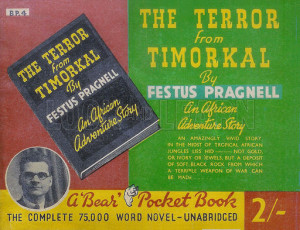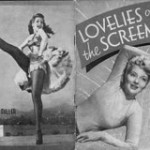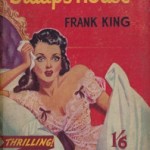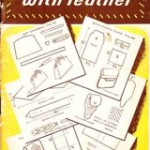Sent in by David Redd this original history of London publisher Bear, Hudson Limited. For which much thanks. Here is the opening part– the rest will follow over the next few weeks..
Introduction
This is the book which caught my eye:
It was small, old (1946), oddly-shaped, and from a publisher new to me, Bear Hudson Limited of London. Over a few years I acquired this and other slightly strange little books from the same firm. Bear Hudson, I discovered, had a bafflingly varied mixture of titles and writers:
- Dames Spell Trouble!
- Say It with Violence!
- Model Railway Construction!
- Make Your Own Motors!
- Women’s Legal Problems!
- N Wesley Firth!
- Eudora Welty!
- Frank Richards without Billy Bunter!
- Bob Hope!
- The Curate Finds the Corpse!
- The Case of the Indiana Torturer!
- and a possible relationship with “Bernards’ Radio Manuals”.
Forgive my lack of title-differentiation and excess of exclamation marks. I have tried investigating to make sense of the wide variation in publications, but Bear Hudson seems to have been the original moving target.
I hope my limited findings may intrigue or amuse – and I hope that someone more knowledgeable may fill in at least a few of the many gaps.
–David Redd, 5th February, 2017.
Covers Gallery: a few tasters from the Bear Hudson numbered booklets.

A typical craft title; toys made from odds and ends. Unusually ambitious in its larger size and full-colour cover. (Also a change of address.)

No. 531: Bear Hudson’s craft titles were supplanted briefly by pulp fiction (Image courtesy of Steve Holland)
But there was rather more to Bear Hudson than these, as my discovery of “The Terror from Timorkal” had hinted.
The Bear Facts
Bear Hudson Limited was a minor UK publisher of general-interest pamphlets and books for about a decade, starting in 1943. (I never did learn where its name came from.) For most of its life it operated out of Hudson House, 63 Goldhawk Road, London, with directors listed as E. Assael and A. Assael. In those war-shadowed days paper was still low in supply and quality, but somehow new publishers kept starting up. Albert Assael had married Judith Babani, sister of the Bernard Babani whose main publishing firm continues today, and members of these two families launched at least half a dozen publishing companies, producing the now-collectable Badger Books, Digit Books, Panther Books and others. The contribution of Eli Assael and his son Albert Assael was Bear Hudson.
(A comma in the firm’s name came and went, and probably should have been used throughout. In these notes, for “Bear Hudson” please read “Bear, Hudson” as appropriate.)
Formed in 1943, Bear Hudson became known for small booklets on craft or home subjects, many now of considerable social history interest. The titles included Model Ships and Boats, You and Your Landlord, and Fashions in Jazz. (A few relative best-sellers achieved reprints, such as Be Clever with Leather by Violet Read, and How to Make Lampshades by F. J. Christopher.)
The Bernards connection
I would guess that Bear Hudson gained its inspiration from the similar but earlier wartime booklets of Bernards (Publishers), Ltd., later Bernard Babani (publishing) Ltd., which now concentrates on computer books. Bernards began in 1942, located first in Shepherds Bush Road and then at The Grampians, Western Gate, both near Goldhawk Road. The Bernards directors were listed as S Babani, B B Babani, J S Assael and A Assael (aha!)
Bernards began publishing with a numbered series of general wartime booklets, mostly of military or engineering interest at first, labelled as “Bernards’ Technical Books” (“each a mine of information”) before changing to “Bernards’ Radio Books” and then the long-running “Bernards Radio Manuals”. Printers varied enormously, but I see the printer of booklet No. 39 credited as “Technical Suppliers Ltd., W.6.” (Remember that name.) A couple of early numbers were fiction, hence labelled “Bernards Fiction Series”, but 99% were factual, including this wonderfully-titled item:
This Bernards formula of thin, concentrated and authoritative booklets (modelled no doubt on successful prewar booklets such as the Electric Guide) was repeated by the Assaels at Bear Hudson. The subjects were initially similar with a general make-and-do emphasis, but soon diverged. While Bernards came to specialise in radio, Bear Hudson concentrated more on homecraft and fiction. (To be continued)








Many, many books in this same format were printed in the US from 1943-1946. They were called Armed Services Editions, and were printed by the Council on Books in Wartime. According to Wikipedia, over 123 million copies of 1,322 books were printed. Supposedly, the odd shape allowed them to fit easily into pockets on web belts, packs and uniforms.
Thanks M. You see the American ones even in UK but the British ones seem thinner on the ground. As you say the format is very much for the reading service person.
Have a Bear Hudson Booklet entitles Paris Interlude, anyone want to buy it.